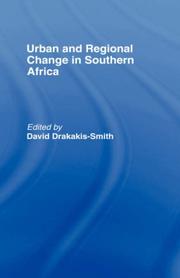| Listing 1 - 3 of 3 |
Sort by
|

ISBN: 0415054419 Year: 1992 Publisher: London New York Routledge
Abstract | Keywords | Export | Availability | Bookmark
 Loading...
Loading...Choose an application
- Reference Manager
- EndNote
- RefWorks (Direct export to RefWorks)
City planning --- Regional planning --- Urbanization --- Africa [Southern ] --- South Africa --- Social conditions --- Urbanization - Africa, Southern. --- Urbanization - South Africa. --- City planning - Africa, Southern. --- City planning - South Africa. --- Regional planning - Africa, Southern. --- Regional planning - South Africa. --- Africa, Southern - Social conditions. --- South Africa - Social conditions.
Book
ISBN: 9781608461202 1608461203 Year: 2012 Publisher: Chicago, Ill.: Haymarket Books ; $a [Minneapolis, Minn.],
Abstract | Keywords | Export | Availability | Bookmark
 Loading...
Loading...Choose an application
- Reference Manager
- EndNote
- RefWorks (Direct export to RefWorks)
Three leading Africa scholars investigate the social forces driving the democratic transformation of postcolonial states across southern Africa. Extensive research and interviews with civil society organizers in Zimbabwe, South Africa, Zambia, Malawi, Namibia, and Swaziland inform this analysis of the challenges faced by non-governmental organizations in relating both to the attendant inequality of globalization and to grassroots struggles for social justice.
Social movements - Africa, Southern --- Social movements - Africa, Sub-Saharan --- Post-apartheid era - Africa, Southern --- Civil society - Africa, Sub-Saharan --- Democratization - Africa, Sub-Saharan --- Capitalism - Social aspects - Africa, Sub-Saharan --- Africa, Sub-Saharan - Social conditions - 1960 --- -Africa, Southern - Social conditions - 1994 --- -Social movements --- Social movements --- Post-apartheid era --- Civil society --- Democratization --- Capitalism --- Africa, Sub-Saharan --- Africa, Southern
Book
ISBN: 1316397114 1316399311 1316162958 1316399850 1316398730 1316400395 110709934X 1107492025 1316393879 Year: 2015 Publisher: Cambridge : Cambridge University Press,
Abstract | Keywords | Export | Availability | Bookmark
 Loading...
Loading...Choose an application
- Reference Manager
- EndNote
- RefWorks (Direct export to RefWorks)
This book traces the South West Africa People's Organization (SWAPO) across its three decades in exile through rich, local histories of the camps where Namibian exiles lived in Tanzania, Zambia, and Angola. Christian A. Williams highlights how different Namibians experienced these sites, as well as the tensions that developed within SWAPO as Namibians encountered one another and as officials asserted their power and protected their interests within a national community. The book then follows Namibians who lived in exile into post-colonial Namibia, examining the extent to which divisions and hierarchies that emerged in the camps continue to shape how Namibians relate to one another today, undermining the more just and humane society that many had imagined. In developing these points about SWAPO, the book draws attention to Southern African literature more widely, suggesting parallels across the region and defining a field of study that examines post-colonial Africa through 'the camp'.
Exiles -- Africa, Southern -- Social conditions. --- Exiles -- Namibia -- Social conditions. --- Memory -- Political aspects -- Namibia. --- Namibia -- History -- 1946-1990. --- National liberation movements -- Namibia -- History. --- SWAPO -- History. --- National liberation movements --- Exiles --- Memory --- History. --- Social conditions. --- Political aspects --- SWAPO --- Namibia --- History --- Retention (Psychology) --- Intellect --- Psychology --- Thought and thinking --- Comprehension --- Executive functions (Neuropsychology) --- Mnemonics --- Perseveration (Psychology) --- Reproduction (Psychology) --- Persons --- Aliens --- Deportees --- Refugees --- Liberation movements, National --- Nationalism --- Revolutions --- Anti-imperialist movements --- S.W.A.P.O. --- South West African Peoples Organisation --- Ovambo People's Organisation --- South West Africa People's Organisation of Namibia --- South West African People's Organization --- South West Africa People's Organisation --- SWAPO of Namibia --- SWAPO Party
| Listing 1 - 3 of 3 |
Sort by
|

 Search
Search Feedback
Feedback About
About Help
Help News
News